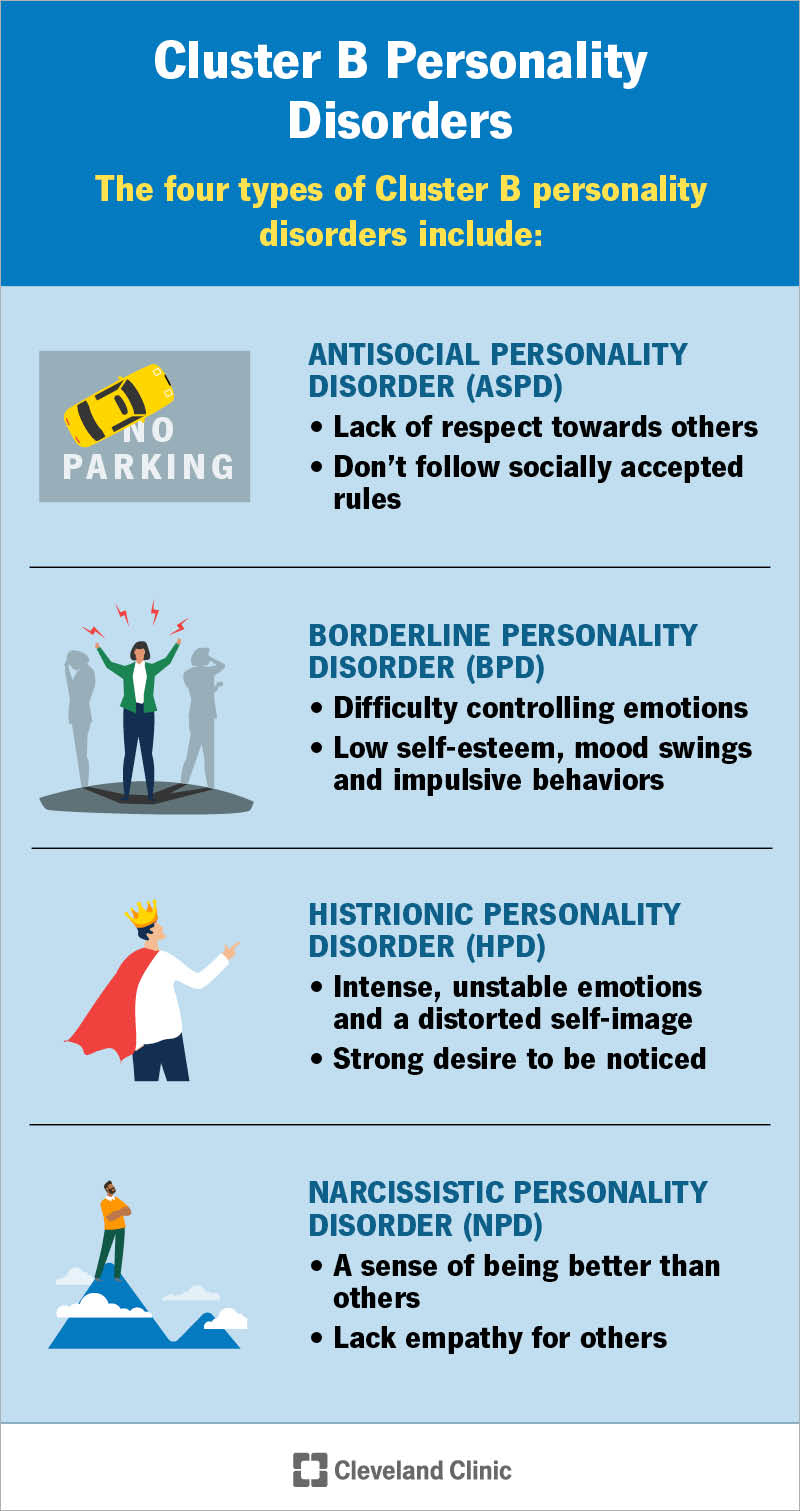Cluster B personality disorders (PDs) involve impulsive and dramatic behavior. There are four types, including borderline PD and antisocial PD. People with these types of personality disorders often don’t realize their thoughts and behaviors are problematic.
Advertisement
Cleveland Clinic is a non-profit academic medical center. Advertising on our site helps support our mission. We do not endorse non-Cleveland Clinic products or services. Policy

Image content: This image is available to view online.
View image online (https://my.clevelandclinic.org/-/scassets/images/org/health/articles/cluster-b-personality-disorders)
Cluster B personality disorders are a group of mental health conditions representing styles of interacting with oneself and others. These styles of interacting involve dramatic and erratic behaviors. People diagnosed with these types of conditions have intense, unstable emotions and act impulsively.
Advertisement
Cleveland Clinic is a non-profit academic medical center. Advertising on our site helps support our mission. We do not endorse non-Cleveland Clinic products or services. Policy
The four types of Cluster B personality disorders include:
These behaviors and thinking patterns can cause distress in many areas of life. This includes work, relationships and socialization.
In general, Cluster B disorder traits include:
As with many of the other personality disorders (PDs), people living with Cluster B PDs often don’t realize there’s an issue with their behavior.
Advertisement
Healthcare providers aren’t sure of the exact cause of Cluster B personality disorders. Research suggests that it’s complex and may involve many factors, from your genetics to certain experiences you had growing up.
Adverse childhood experiences (ACEs) are especially linked to Cluster B PDs. They include:
Compared to other personality disorder clusters, people with Cluster B disorders are at increased risk of:
As with other PDs, people living with Cluster B PDs are more likely to be diagnosed with mood and/or anxiety disorders, as well.
Healthcare providers use criteria in the American Psychiatric Association’s DSM-5 to diagnose Cluster B personality disorders. Each PD type has specific criteria. Providers ask questions about a person’s medical, personal and social history to guide diagnosis.
Diagnosis can be difficult, as most people living with these conditions may not seek treatment. This is often due to community mental health stigma or a lack of insight into their behaviors. So, mental health professionals may also work with the person’s loved ones and other acquaintances to gather more information.
Psychotherapy (talk therapy) can help you manage living with Cluster B personality disorders. You’ll work with a mental health professional, like a psychologist. They can provide support, education and guidance to you and your family. They can also help you learn healthier ways of navigating emotions and relationships.
There are several types of talk therapy. Some types may work better than others for certain Cluster B PDs. For example, dialectical behavior therapy (DBT) tends to be a more effective treatment for BPD. People with HPD often benefit from cognitive-behavioral therapy (CBT).
Currently, there are no FDA-approved medications to treat PDs directly. But you may take medications to treat symptoms of other mental health conditions you may have, like depression and anxiety.
The outlook (prognosis) for Cluster B personality disorders varies. It depends on your willingness to get treatment and how severe your symptoms are.
Living with an undiagnosed and untreated Cluster B personality disorder may result in:
Advertisement
But with treatment, it’s possible to improve your behaviors, thinking patterns and quality of life.
It’s important to remember that Cluster B personality disorders are mental health conditions. As with all mental health conditions, seeking help as soon as symptoms appear can help decrease the disruptions to your life. Mental health professionals can design tailored treatment plans that can help you better manage your thoughts and behaviors.
Loved ones of people with PDs can experience stress, depression, grief and isolation. Reach out for help if you have these symptoms.
Advertisement

Sign up for our Health Essentials emails for expert guidance on nutrition, fitness, sleep, skin care and more.
Learn more about the Health Library and our editorial process.
Cleveland Clinic’s health articles are based on evidence-backed information and review by medical professionals to ensure accuracy, reliability and up-to-date clinical standards.
Cleveland Clinic’s health articles are based on evidence-backed information and review by medical professionals to ensure accuracy, reliability and up-to-date clinical standards.
Your mental well-being is just as important as your physical well-being. Cleveland Clinic’s mental health experts can help you live life to the fullest.
